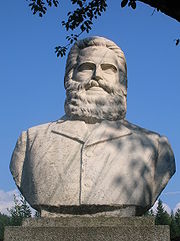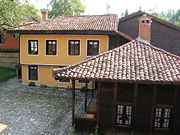
Lyuben Karavelov
Encyclopedia

Lyuben Stoychev Karavelov (c. 1834 – 21 January 1879) was a Bulgarian writer and an important figure of the Bulgarian National Revival
Bulgarian National Revival
The Bulgarian National Revival , sometimes called the Bulgarian Renaissance, was a period of socio-economic development and national integration among Bulgarian people under Ottoman rule...
.
Karavelov was born in Koprivshtitsa
Koprivshtitsa
Koprivshtitsa is a historic town in Sofia Province, central Bulgaria, lying on the Topolnitsa River among the Sredna Gora mountains. It was one of the centres of the April Uprising in 1876 and is known for its authentic Bulgarian architecture and for its folk music festivals, making it a very...
. He began his education in a church school
Church school
A church school is a place of education, the precise nature of which varies from one national jurisdiction to another.The State of Alabama defines a church school as follows:...
, but in 1850 he moved to the school of Nayden Gerov
Nayden Gerov
Nayden Gerov , born Nayden Gerov Hadzhidobrevich February 23, 1823, Koprivshtitsa–October 9, 1900, Plovdiv) was a Bulgarian linguist, folklorist, writer and public figure during the Bulgarian National Revival....
in Plovdiv
Plovdiv
Plovdiv is the second-largest city in Bulgaria after Sofia with a population of 338,153 inhabitants according to Census 2011. Plovdiv's history spans some 6,000 years, with traces of a Neolithic settlement dating to roughly 4000 BC; it is one of the oldest cities in Europe...
. He was then sent by his father to study in a Greek school for two years, before transferring to a Bulgarian school, where he also studied Russian literature
Russian literature
Russian literature refers to the literature of Russia or its émigrés, and to the Russian-language literature of several independent nations once a part of what was historically Russia or the Soviet Union...
. He moved to Odrin for an apprenticeship, but he soon came back to Koprivshtitsa and was sent to Constantinople
Constantinople
Constantinople was the capital of the Roman, Eastern Roman, Byzantine, Latin, and Ottoman Empires. Throughout most of the Middle Ages, Constantinople was Europe's largest and wealthiest city.-Names:...
in 1856. There he developed a strong interest in politics and the Crimean War
Crimean War
The Crimean War was a conflict fought between the Russian Empire and an alliance of the French Empire, the British Empire, the Ottoman Empire, and the Kingdom of Sardinia. The war was part of a long-running contest between the major European powers for influence over territories of the declining...
. At the same time, he studied the culture and ethnography
Ethnography
Ethnography is a qualitative method aimed to learn and understand cultural phenomena which reflect the knowledge and system of meanings guiding the life of a cultural group...
of the region.
In 1857, Karavelov enrolled in the Faculty of History and Philology at the University of Moscow, where he fell under the influence of Russian revolutionary democrats, was placed under police surveylance in 1859, and took part in student riots in 1861. With a group of other your Bulgarian student radicals, he published a journal and started writing poetry and long short stories in Bulgarian, scholarly publications in Bulgarian ethnography and journalism in Russian. In 1867 he went to Belgrade
Belgrade
Belgrade is the capital and largest city of Serbia. It is located at the confluence of the Sava and Danube rivers, where the Pannonian Plain meets the Balkans. According to official results of Census 2011, the city has a population of 1,639,121. It is one of the 15 largest cities in Europe...
as a correspondent for Russian newspapers, started publishing prose and journalism in Serbian, in 1868 was forced to move to Novi Sad
Novi Sad
Novi Sad is the capital of the northern Serbian province of Vojvodina, and the administrative centre of the South Bačka District. The city is located in the southern part of Pannonian Plain on the Danube river....
, Austria-Hungary
Austria-Hungary
Austria-Hungary , more formally known as the Kingdoms and Lands Represented in the Imperial Council and the Lands of the Holy Hungarian Crown of Saint Stephen, was a constitutional monarchic union between the crowns of the Austrian Empire and the Kingdom of Hungary in...
, for his contacts with the Serb opposition (led by Svetozar Marković
Svetozar Markovic
Svetozar Marković was an influential Serbian political activist and literary critic. He developed an activistic anthropological philosophy with a definite program of social change.-Early life:...
), was arrested and spent time in a Budapest
Budapest
Budapest is the capital of Hungary. As the largest city of Hungary, it is the country's principal political, cultural, commercial, industrial, and transportation centre. In 2011, Budapest had 1,733,685 inhabitants, down from its 1989 peak of 2,113,645 due to suburbanization. The Budapest Commuter...
prison for alleged participation in a conspiracy, and in 1869 settled in Bucharest
Bucharest
Bucharest is the capital municipality, cultural, industrial, and financial centre of Romania. It is the largest city in Romania, located in the southeast of the country, at , and lies on the banks of the Dâmbovița River....
with the intent to start his own newspaper and to cooperate with the newly founded Bulgarian Scholarly Society (the future Bulgarian Academy of Sciences
Bulgarian Academy of Sciences
The Bulgarian Academy of Sciences is the National Academy of Bulgaria, established in 1869. The Academy is autonomous and has a Society of Academicians, Correspondent Members and Foreign Members...
).
At his first newspaper Svoboda (Freedom) in Bucharest (1869–1873), we worked and became friends with poet and revolutionary Hristo Botev
Hristo Botev
Hristo Botev , born Hristo Botyov Petkov , was a Bulgarian poet and national revolutionary. Botev is widely considered by Bulgarians to be a symbolic historical figure and national hero.-Early years:...
who devoted a poem to him. In 1870, Karavelov was elected chairman of the Bulgarian Revolutionary Central Committee
Bulgarian Revolutionary Central Committee
The Bulgarian Revolutionary Central Committee or BRCK was a Bulgarian revolutionary organisation founded in 1869 among the Bulgarian emigrant circles in Romania. The decisive influence for the establishment of the committee was exerted by the Svoboda newspaper which Lyuben Karavelov began to...
, where he worked with Vasil Levski
Vasil Levski
Vasil Levski, born Vasil Ivanov Kunchev, , is a Bulgarian revolutionary and a national hero of Bulgaria. Dubbed the Apostle of Freedom, Levski ideologised and strategised a revolutionary movement to liberate Bulgaria from Ottoman rule...
, the leader of the Internal Revolutionary Organization; he shared Levski's ideas of a democratic republic as the goal of the national revolution. Karavelov admired the political systems of Switzerland
Switzerland
Switzerland name of one of the Swiss cantons. ; ; ; or ), in its full name the Swiss Confederation , is a federal republic consisting of 26 cantons, with Bern as the seat of the federal authorities. The country is situated in Western Europe,Or Central Europe depending on the definition....
(which he believed was the model for the ethnically diverse Balkans) and the United States; he praised the American public education system, as well as the emancipated (in his opinion) status of American women.

Karavelov died in 1879, soon after the liberation of Bulgaria
Liberation of Bulgaria
In Bulgarian historiography, the term Liberation of Bulgaria is used to denote the events of the Russo-Turkish War of 1877-78 that led to the re-establishment of Bulgarian state with the Treaty of San Stefano of March 3, 1878, after the complete conquest of the Second Bulgarian Empire, which...
, in Rousse
Rousse
Ruse is the fifth-largest city in Bulgaria. Ruse is situated in the northeastern part of the country, on the right bank of the Danube, opposite the Romanian city of Giurgiu, from the capital Sofia and from the Bulgarian Black Sea Coast...
.
Karavelov's works include the short novels Old Time Bulgarians ' onMouseout='HidePop("69335")' href="/topics/Petko_Karavelov">Petko
Petko Karavelov
Petko Karavelov was a leading Bulgarian liberal politician who served as Prime Minister on four occasions....
was a prominent figure in Bulgaria
Bulgaria
Bulgaria , officially the Republic of Bulgaria , is a parliamentary democracy within a unitary constitutional republic in Southeast Europe. The country borders Romania to the north, Serbia and Macedonia to the west, Greece and Turkey to the south, as well as the Black Sea to the east...
's political life in the late 19th century.

